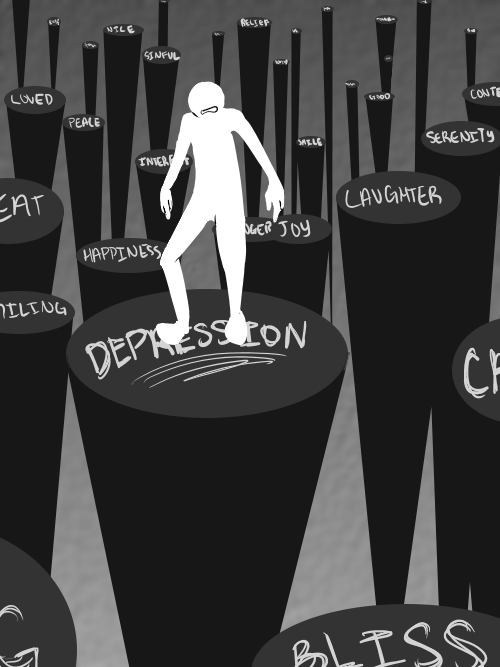Anxiety

Everyone has periods of feeling anxious in their lives. This could be due to starting school, a new job, getting married or visiting the dentist. People can feel anxious during times of stress in their lives. This is normal and to be expected. Once the stressful event is over the anxious feelings disappear.
For some however, they find themselves incapacitated by anxiety even in the absence of any stressful life events. They feel as though they have no control over how their body is reacting and aren’t able to function in their day to day lives because of this. Let’s take a closer look at some of the symptoms of anxiety disorder.
1. Excessive Worry
People with generalized anxiety disorder tend to be afflicted with excessive worrying. Over everything and anything. They have trouble with racing thoughts to the extent these thoughts become more and more intense and feed upon each other.
They worry about little things and blow them out of proportion with a negative twist. They can’t stop worrying or slow their thoughts down. This causes more distress which in turn causes more worry. It’s a self-perpetuating disorder and can quickly become incapacitated, preventing the individual from functioning.
PC:footnotescounseling.com
2. Sleep Disturbance
People with anxiety disorder often complain of sleep disturbance. They have difficulty with racing thoughts to the extent these thoughts may prevent them from falling asleep or in extreme cases keep them up all night. Even if they are able to fall asleep, they may wake up several times during the night and experience nightmares or a restless sleep.
They are often physically exhausted. Sleep deprivation makes them more prone to physical illness, weakens the immune system and interferes in their mental acuity, which can be required for work and to problem-solve.

3. Panic Attacks
People experiencing extreme episodes of anxiety may also experience what is referred to as “panic attacks.” These can be terrifying episodes in which the individual may experience symptoms similar to those of a cardiac arrest.
Their heart and respiratory rates increases, they may have difficulty breathing and feel as though a heavy weight is on their chest and they may break out in a sweat. Medical tests will prove negative when individuals are in fact experiencing a panic attack.
4. Nausea and Vomiting
People with anxiety disorder may experience nausea and vomiting induced by an exaggerated stress reaction. This may be further exacerbated when they try to eat while feeling anxious.
During a stress reaction the body diverts oxygenated blood from the organs including the stomach to the major muscles in order for the body to be able to “fight or flee.” This is a primitive protective mechanism.
5. Muscle Tension
People with anxiety disorder often experience near-constant muscle tension. This may include wringing hands, balling fists, clenching jaw, stiff neck, or a sore back. During the primitive stress reaction your body is priming itself to ward off danger by running away or physically fighting.
Hence the tightened muscles, ready for action. Relaxation techniques coupled with regular exercise can be effective to combat the tension arising from anxiety.
P.C: biondisportstherapy
6. Flashbacks
Some people with anxiety will experience flashbacks of a past event which produced severe anxiety for them. In cases of extreme trauma another condition called Post-traumatic Stress Disorder (PTSD) may develop.
PTSD shares similarities to anxiety disorder however it is not the same condition. Researchers in 2006 published a study in the Journal of Anxiety Disorders which found PTSD-like flashbacks in people with social anxiety disorder.

P.C: thehansindia
7. Social Anxiety
Some people experience anxiety in social settings such as office parties or where large crowds gather such as amusement parks, shopping malls or grocery stores. This can be a particularly disabling form of anxiety as it can negatively impact important areas of a person’s life.
When these people find themselves thrust into social or crowded environments their stress response becomes so heightened that they may shut down emotionally and even experience panic attacks. Therapy may include anti-anxiety medication, Cognitive behavioral therapy (CBT) or desensitization therapy in which the person is gradually introduced to larger crowds or social settings for increasing periods of time.

P.C: m1psychology
8. Stage Fright
Fear of speaking or performing in public is said to be the biggest fear reported by adults. This fear is ranked higher than the fear of flying, bankruptcy, illness and death. Even seasoned actors or musicians may find themselves afflicted with this disorder. Others may pass up promotions at work or give up the opportunity to perform a eulogy at the funeral of a loved one.
Stage fright can be managed and overcome. Learning to use CBT strategies can be extremely effective in stopping the cycle of avoiding fearful situations. Medications and natural remedies also have their place. For the best results you may need to use a combination of all.

assets.entrepreneur.com
Reference:
http://www.activebeat.com/your-health/women/8-common-symptoms-of-anxiety-disorder/4/
Featured Image: realnaturalhealth




























































